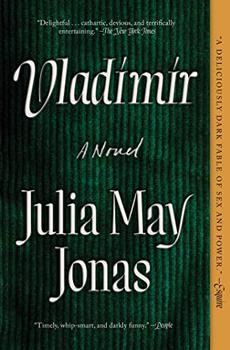Summary | Excerpt | Reading Guide | Reviews | Beyond the Book | Readalikes | Genres & Themes | Author Bio

A Novel
by Julia May Jonas
"Sorry," we both said.
"Jinx," I said.
When the drinks were fixed, I led him out to the living room. He sat on the loveseat across from me and spread out in an appealingly masculine way, with a big, wide cross of one leg over the other, ankle to knee. He told me that he had a young child at home, three years old (Philomena, but they called her Phee), and that his wife (a person of great fascination to the department who would be teaching a memoir-writing class for us, a beautiful woman I had seen at faculty events but not yet spoken to) was not adjusting well to the change to the country from the city. He asked where my husband was and seemed surprised when I told him that he was out getting a drink with a former student.
"A student?"
I clarified that it was a male student, which relaxed him.
My husband, John, is the chair of our small English Department in our small upstate New York college, population less than 2,200 students. At the start of the spring semester (last January), our department was handed a petition, with more than three hundred signatures, requesting his removal. Attached to the petition were affidavits by seven women, now of various ages, former students at the college, who, over the course of his twenty-eight years of teaching here, had engaged with him sexually. None, mind you, in the past five years, after teacher/student relationships were explicitly banned. At one point we would have called these affairs consensual, for they were, and were conducted with my vague understanding that they were happening. Now, however, young women have apparently lost all agency in romantic entanglements. Now my husband was abusing his power, never mind that power is the reason they desired him in the first place. Whatever the current state of my marriage may be, I still can't think about it all without my blood boiling. My anger is not so much directed toward the accusations as it is toward the lack of self-regard these women have—the lack of their own confidence. I wish they could see themselves not as little leaves swirled around by the wind of a world that does not belong to them, but as powerful, sexual women interested in engaging in a little bit of danger, a little bit of taboo, a little bit of fun. With the general, highly objectionable move toward a populist insistence of morality in art, I find this post hoc prudery offensive, as a fellow female. I am depressed that they feel so guilty about their encounters with my husband that they have decided he was taking advantage of them. I want to throw them all a Slut Walk and let them know that when they're sad, it's probably not because of the sex they had, and more because they spend too much time on the internet, wondering what people think of them.
Vladimir Vladinski, the young, new professor, who I imagined would work his way up to chair of the department in his tenure, if he receives tenure (which he will, given his adroitness, his literary reputation, his youth, his clear ambition), looked around my living room. I followed his eyes as they rested on the marquee-sized poster of Buñuel's Belle de Jour, bought as part of a Film Forum fundraiser when they were liquidating their poster stock, and the series of framed prints from the homes of great American writers, put together after the cross-country adventure we took when my daughter, Sidney, was eight, and we mapped the trip by visiting the hometowns of important American novelists, from Hemingway to Faulkner to O'Connor to Morrison to Wright to Cather to Didion in Los Angeles. To his left, on the wall, backed and hung, were our brochures of the Dostoevsky museum, the Tolstoy museum, and the Turgenev museum from our trip to Russia. On the shelf below the coffee table, piled high, were the programs of the theater we'd seen in our yearly week in New York City. There was nearly an entire wall devoted to representations of Don Quixote, and a large map of Spain, upon which his journey was tracked with pins and coasters from cafés in those towns. A shrine to our far-flung travel stood in a corner of the room, a collection that included an authentic Noh theater Shiite mask, several little statues purchased in the Ariaria Market in Nigeria, Norwegian-carved bookends, a Swedish antique coffeepot, a sitar from India, and a Moroccan wall hanging.
Excerpted from Vladimir by Julia May Jonas. Copyright © 2022 by Julia May Jonas. Excerpted by permission of Avid Reader Press. All rights reserved. No part of this excerpt may be reproduced or reprinted without permission in writing from the publisher.




Books are the carriers of civilization
Click Here to find out who said this, as well as discovering other famous literary quotes!
Your guide toexceptional books
BookBrowse seeks out and recommends the best in contemporary fiction and nonfiction—books that not only engage and entertain but also deepen our understanding of ourselves and the world around us.